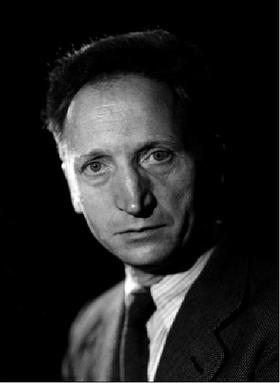Still working to recover. Please don't edit quite yet.
Augustin Souchy
Augustin Souchy (August 28, 1892— January 1, 1984) was a German anarchist, antimilitarist, and journalist.
First World War[edit]
At the outbreak of the First World War he moved in Austria. From there he was deported to and forced to wear a sign around his neck that read "Beware: Anarchist!", which later became the title of his political memoirs. Souchy then moved to Sweden where he experienced passport problems and was imprisoned by the Swedish government in response to his antimilitarist propagandizing.. He escaped prison and traveled illegally to Denmark and Norway. In 1919 he returned to Germany and joined the anarcho-syndicalist Free Workers' Union of Germany (FAUD). From April to November 1920 he traveled to Russia to meet with Vladimir Lenin as a representative of syndicalists and to attend Comintern. During this time he visited one of the most important anarchist theorists of the day Peter Kropotkin. Kropotkin warned against revolutionary groups using a central party as an instrument of conquest of power.
Weimer Republic[edit]
In 1921 he worked in France and fathered a child, Jean with Therese Souchy but was again expelled from the country for being an anarchist. He returned to Germany and worked as an editor of the newspaper The Syndicalist (Der Syndikalist) until the early 30s. Together with Rudolf Rocker he organized within the International Workers Association, which in itself was an international organization to counter the Bolshevik Profintern. During this time he met a number of anarchists from different countries, who repeatedly found refuge in Berlin, including the Russian anarchists who fled the Bolsheviks or Spanish anarchists such as Durruti. After the overthrow of the Spanish monarchy in 1931 he undertook several trips to Spain under the behalf of the IWA. In a letter to Emma Goldman in 1936 he wrote:
"In the last five years I was here [Spain] five times. Every time there was a movement. April 1931; revolution. Uprising in December 1931. December 1932; general strike. April 1933, general strike again. In October 1934 Catalonia rises against Castilian hegemony. 1935 ferments it. February 1936 overthrow of Gil-Robles. New uprising... Today great meeting will be held in the monumental Kampwerth bull arena. Organized by anarchist youth, libertarian youth. I will come forth to this meeting to speak. The arena can hold 100,000 I have been assured."
The meeting was cancelled, as Franco and his military conspirators staged their coup d'état the night before the event was to be held.
Exile[edit]
A few days before the arrest of his friend, anarchist writer Erich Mühsam by the Nazis, Souchy fled to Paris and lived in Paris. At the outbreak of the Spanish Civil War he tried to send money and weapons to the Spanish anarcho-syndicalist union CNT-FAI. Later, he wrote his most influential books on collectivization in Anarchist Catalonia. It was in Spain that he wrote his work The Tragic Week in May, one the few firsthand accounts of the Barcelona May Days of 1937 available. After the defeat of the Spanish Revolution in 1939 Souchy attempted returned to France but was detained for two years in a prison camp.
In 1942 he escaped to Mexico, where he lived until 1948 and published numerous books about libertarian socialism and the Spanish collectives. In 1952 he traveled to Israel and studied kibbutzim. Following his experience there, Souchy traveled to Cuba and was briefly involved with the very lively Cuban anarchist movement. In the late 1950s, he undertook an unsponsored lecture tour of Latin America to try and advance trade unionism. In 1963 the International Labour Organization hired him as an educational expert. Until then, Souchy had worked exclusively in the anarchist and anarcho-syndicalist movement. Smiling, Souchy said "to imagine, at 71 years old, when others had long since retired, I got my first job."
Return to Germany[edit]
In 1966 Souchy settled in Munich and was frequently interviewed by the German media in newspapers such as "Der Spiegel" among others and was featured in radio broadcasts. As early as 1950, Souchy had begun to publish his work in Germany and he continued to write for the next twenty years. In 1983, Souchy met with Clara Thalmann for the first time since 1937 and returned to Spain for 6 weeks with filmmakers to document where both had participated in the struggle against fascism. In 1984 the film was published under the title The Long Hope(Die lange Hoffnung).
On January 1, 1984, Augustin Souchy died of pneumonia at the age of 91 years in a Red Cross hospital in Munich. There was no funeral and no grave, his body was donated to science.
External links[edit]
| This article contains content from Wikipedia. Current versions of the GNU FDL article Augustin Souchy on WP may contain information useful to the improvement of this article | WP |
